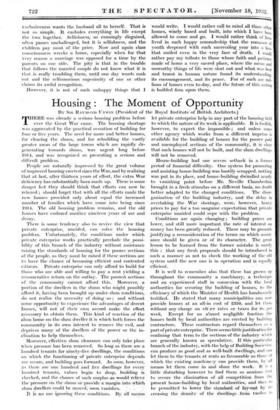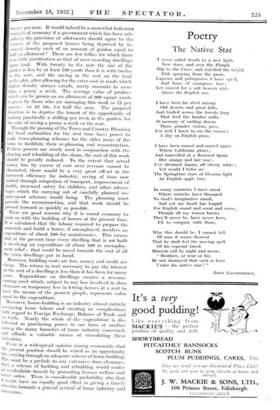Housing : The Moment of Opportunity By SIR RAYMOND UNWIN
(President of the Royal Institute. of British Architects.) THERE was already a serious housing problem before ever the Great War came. The housing shortage was aggravated by the practical cessation of building for four or five years. The need for more and better houses, for clearing the slums, and for rebuilding the vastly greater areas of the large towns whi.th. are rapidly de- generating towards slums, was urgent long before 1914,- and was recognized as presenting a serious and . • difficult problem. . _ People are naturally impressed by the 'great volume of improved housing erected since the War, and by realizing that at last, after thirteen years of effort, the extra War deficiency has substantially been made up. There is some danger lest they should think that efforts can now be relaxed ; should forget that with all the efforts made the new houses provided only about _equal the increased number of families which have "Come into being since 1914. The old- housing problem remains, and the old houses have endured another nineteen years of use and decay.
There is some tendency also to revive the view that private enterprise, unaided, can solve the housing problem. Unfortunately, the conditions under which private enterprise works practically preclude the possi- bility of this branch of the industry without assistance raising the standards of housing- for the poorer sections of the people, as they must-be raised if these 'sections are to have the chance of becoming efficient and contented citizens. Private enterprise' can only afford to build for those who are able and willing to pay a rent yielding a remunerative return on the outlay. The poorest sections of the corn mutiny- cannot afford this. Moreover, a. portion of the dwellers in the slums who Might possibly afford it, having been brought up under slum conditions, do not realize the necessity of doing so ; and without sonic opportunity to-experience the advantages of decent homes, 'will not Of their own accord make the effort necessary to obtain them. This kind of reaction of the slum home on the slum dweller it is which, both forces the community in its own interest to remove the evil, and deprives many of the dwellers of the power- or the in- clination to help themselves.
Moreover, effective slum clearance can 'only take place ivlien pressure has been removed: So long as there are a hundred tenants for ninety_afive dwellings, the conditions on which -the functioning of private enterprise depends are secure, and building goes forward. As soon, however, as there are one hundred and five dwellings for every hundred tenants, values begin to drop, building is checked, and the chance of such surplus as would:relieve the pressure 'on the slums or provide a Margin-Mtn-Which slum dwellers could be Moved, 'soon vanishes.
It is no use ignoring these conditions. By Alf-metins. let private enterprise help in any part of the housing field to which the nature of its work is applicable. It is foolish, however, to expect the impossible; and unless sonic other -agency which works from -a different impetus is available for the building of houses for the poorer paid and unemployed sections of the community, it is cleat that such houses will not be built, and the slum dwellings will not be removed. • House-building had one severe setback in a former period of financial difficulty. One system for promoting and assisting house-building was hastily scrapped, nothing was put in its place, and house-building dwindled nearly to vanishing point before Mr. Neville Chamberlain brought in a fresh stimulus on a different basis, .no doubt better adapted to the changed conditions. The disor- ganization of the building industry, and- the delay in overtaking the War shortage, were, however, heavy prices to pay for a too sanguine expectation that private enterprise unaided could cope with the problem.
Conditions are again changing ; 'building prices are lower, and still more important the rate of interest on money has been greatly reduced. These may be grounds justifying a 'reconsideration of the terms on which assist- ance -should be given or of its character. The great lesson to be learned from the former mistake is surely this : that any fresh proposals should be introduced in such a manner as not to check the working of the old system until the new -one is in operation and is equally efficient. '
It is well to remember also that there has grown up throughout the community -a machinery, a- technique and an experienced staff in connexion with -the local authorities for securing the building of houses, to the efficiency of which the Minister of Health has handsomely testified. He stated that many municipalities can now provide houses at an 'all-in cost -of £350,- and let them without any charge on eit-ier rates or -taxes for 8s. per week. Except for an almost negligible fraction the houses built by local authorities- are erected by building contractors. These contractors regard . themselves as a part of private enterprise. -There seems little justification for confining that term to the sections of the industry which are generally known as speculative. If this particular branch of the industry, with the help of Building Societies, can produce as good 'and as well-built dwellings, and can let them to the-tenants at rents as Savourable -as those at which the existing- machine:7y • can provide them, by all means let them come in and share the work. -It is a little disturbing however -to find them so anxious first to secure the . elimination of all competition from the present house-building by local authorities, and then to be permitted to' lower -the standard-of 4apout by in' creasing the density Of the dwellings frOm twelve_ tu twenty per aere, It would indeed be a somewhat ludicrous example of economy if a government which has been sub- sidizing the-provision of allotments should agree to the tenants of the proposed houses being deprived by in- (leased density each of an amount of garden equal to half an allotment There are few follies for which there is so little -justification as that of over-crowding dwellings upon land. With twenty to the acre the size of the Tarden is less by at least 160 yards than it is with twelve to the acre, and the saving in the cost on the land in the plot, after allowing for the extra cost in roads which higher density always entails, rarely amounts to more than a penny a week. The average value of produce which can be grown on an allotment of 300 square yards is given by those who arc managing this work as £5 per annum : or I:2 10s. for half the area. The proposal therefore is to deprive the tenant of the opportunity of making practically a shilling per week in the garden, for the sake of saving a penny a week on the rent.
Through the passing of the Town and Country Planning Act local authorities for the first time have power to make town-planning schemes for the older areas of the town to facilitate their re-planning and reconstruction. If these powers are wisely used in conjunction with the clearing and rebuilding of the slums, the cost of this work should be greatly reduced. To the extent that actual money loss by excess of cost over revenue cannot be eliminated, there would be a very great off-set in the increased efficiency for industry, saving of time now wasted through congestion of transport, improvement of health, increased safety for children, and other advan- • tages which the carrying out of carefully planned im- provement schemes would bring. The planning must precede the reconstruction; and that work should be pressed forward as quickly as possible.
There are good reasons why it is sound economy to push on with the building of houses at the present time. It is calculated that the labour required to prepare the materials and build a house, if unemployed, involves an expenditure of about £80 for maintenance. This means that at the present time every dwelling that is not built is involving an expenditure of about £80 in unemploy- ment relief ; that could be saved towards the cost of all the extra dwellings put in hand.
Moreover, building costs are low, money and credit are Cheap. The return in rent necessary to pay the interest on the cost of a dwelling is less than it has been for many years. Expenditure. on dwellings creates a revenue- earning asset which, subject to any loss involved in slum clearance or temporary loss in letting houses at a rent to meet the means of the poorest people, represents value equal to the expenditure.
Moreover, house-building is an industry almost entirely Occupying home labour and creating no complications with regard to Foreign Exchange, Balance of Trade and so forth. Nearly the whole of the expenditure is dis- tributed as purchasing power in one form or another among the many branches of home industry concerned, and affords a valuable means of stimulating these industries.
There is a widespread opinion among economists that the present position should he seized as an opportunity for Carrying through an adequate scheme of home building. This must be a prelude to any extensive slum clearance. Such a scheme of building and rebuilding would confer an incalculable benefit by promoting human welfare and social order. There is considerable probability also that (taught have an equally good effect in giving a timely stimulus towards a general revival of home industry and commerce,

































































 Previous page
Previous page